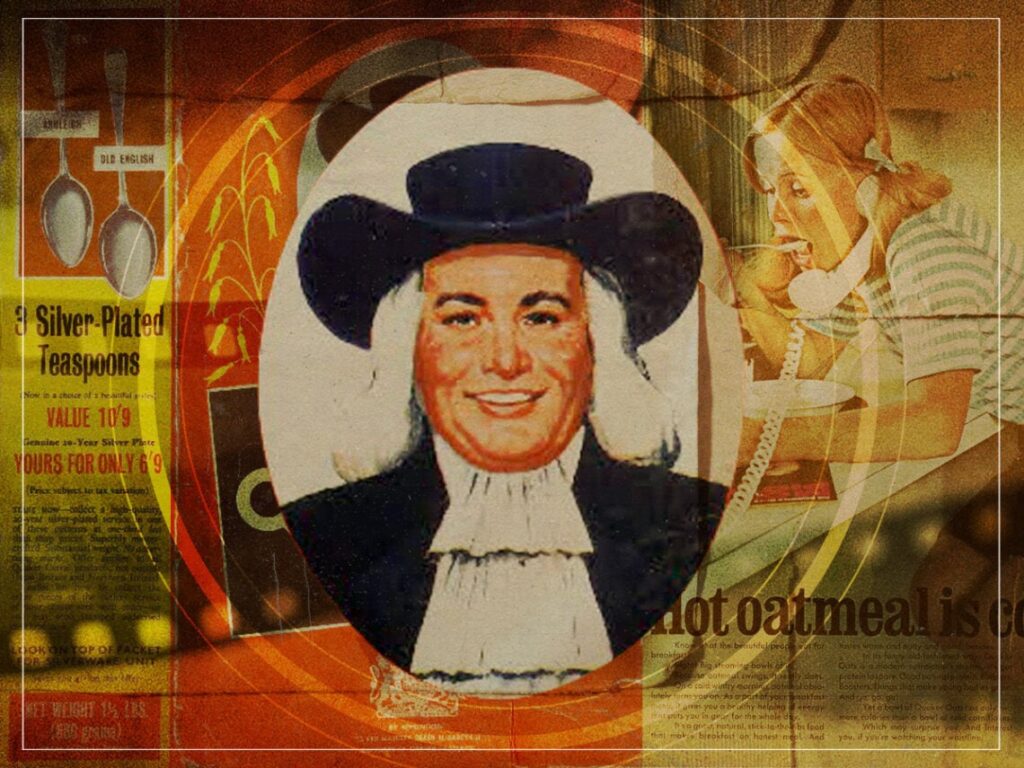Willy Wonka: The classic movie that would never have happened without Quaker Oats
 Posted On
Posted On
(Credits: Far Out / Quaker Oats / Original Promo)
Corporate shilling and brand tie-ins have become increasingly common ways of funding, packaging, distributing, and selling movies to the masses, but Quaker Oats being entirely responsible for a generational classic doesn’t come across as one of the most obvious cross-promotional tools.
There wasn’t even a shred of product placement in the most obvious sense, either, but the company was nonetheless single-handedly to thank for a film that eventually took its pace as a cast-iron favourite. What began as a mutually beneficial partnership eventually snowballed into something else altogether, thanks to the men in suits repping the oat company becoming desperate for their next big consumable hit.
Not that Quaker Oats had fallen on hard times by the early 1970s because the conglomerate was almost a century into its existence by that point. However, the company was seeking to carve out a bigger market share of the oversaturated candy bar market, and it was coincidentally deep in discussions with its own subsidiary Breaker Confections over how to do just that.
The domino effect began with a ten-year-old girl who read a whimsical novel and thought it would make an excellent motion picture. Pitching her own father with the idea, filmmaker Mel Stuart was sufficiently won over by the enthusiastic endorsement that he went to friend and producer David L Wolper, suggesting they put their heads together and bring Roald Dahl’s Charlie and the Chocolate Factory to the screen.
With the lightbulb going off in his head, Wolper – who was part of those aforementioned talks with the Quaker Oats folks about rolling out a new chocolate bar – approached the company about purchasing the rights to the story, transforming it into a fantastical feature that would provide fun for the whole family, footing the entire cost of production, and introducing the Wonka Bar to shelves to capitalise on the obvious cross-pollination between cinema and snacking.
Essentially, a small child begged her dad to turn a book she loved into a movie, which somehow ended up with a national corporation with its finger in many pies of the edible and non-edible variety making its very first foray into the world of motion pictures to snap up the rights to Dahl’s book and stump up the whole $3million production budget for the express purpose of selling more sweets.
Cynical? Yes. Successful? Not so much. As popular as it continues to be, the slightly rebranded Willy Wonka & the Chocolate Factory was not a runaway smash hit and only gained its current and ongoing status as a childhood staple when it began airing repeatedly on television years after it underperformed in the multiplex. As for the Wonka Bars themselves, the original batch had to be quickly pulled from shelves after Quaker struggled with the recipe, with the chocolate capable of melting if anyone glanced in its direction.
Those kinks were hammered out eventually, though, and the Wonka Bar remained in circulation for decades. If anyone’s ever watched Gene Wilder slaloming his way through his manic performance in Willy Wonka & the Chocolate Factory and suddenly been left with an unexplainable hankering for either some chocolate or a big fat steaming bowl of oats, then the subliminal messaging has done its job.
[embedded content]
Related Topics


